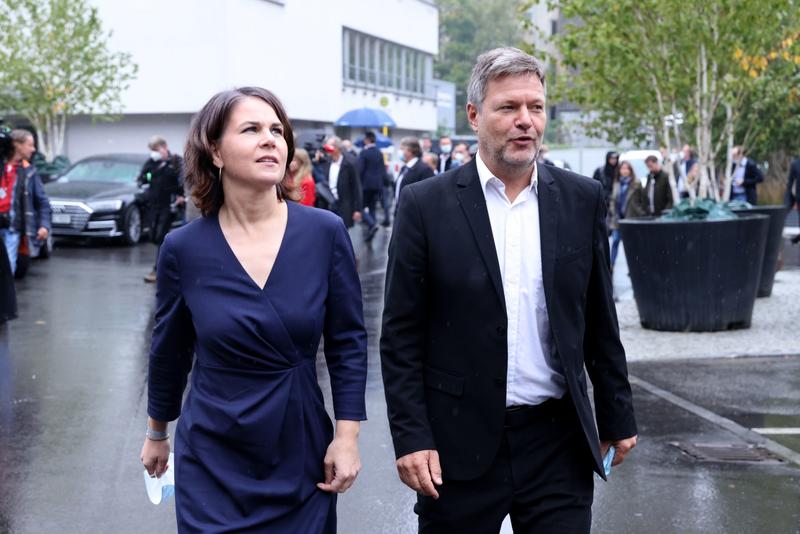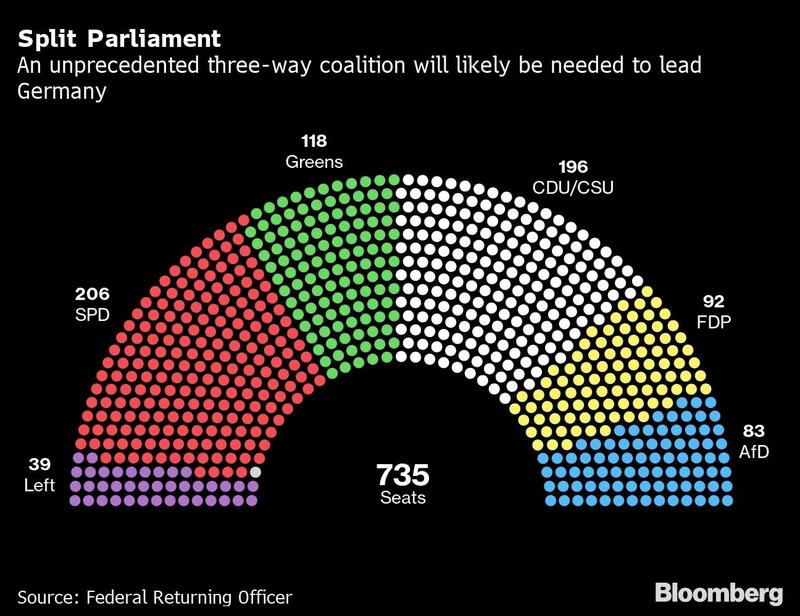 This photo captures Annalena Baerbock (left) and Robert Habeck, co-leaders of the Green Party, following coalition talks at the EUREF Campus in Berlin, Germany on Oct 5, 2021. (PHOTO / BLOOMBERG)
This photo captures Annalena Baerbock (left) and Robert Habeck, co-leaders of the Green Party, following coalition talks at the EUREF Campus in Berlin, Germany on Oct 5, 2021. (PHOTO / BLOOMBERG)
German election victor Olaf Scholz inched closer to succeeding Chancellor Angela Merkel, as the two potential junior coalition partners opted to pursue talks with Social Democrats (SPD) in a snub to her conservatives.
Scholz’s party is set to begin exploratory talks on Thursday with the Greens and the Free Democrats (FDP) on a three-way governing coalition — a key step in a process that will likely take months.
The Social Democrats are set to begin exploratory talks with the Greens and the Free Democrats on a three-way governing coalition
“We’re very grateful for the very professional manner in which both the FDP and the Greens have pushed ahead with efforts to form a government,” Scholz told reporters in a brief statement on Wednesday. “It’s about forming a government that can take Germany forward.”
The three-way coalition under Scholz — Merkel’s vice-chancellor and finance minister since 2018 — has become the likeliest scenario after the Social Democrats’ narrow victory on Sept 26. The historic win has sent the CDU/CSU alliance into disarray as it risks crashing out of power after 16 years under Merkel.
ALSO READ: German parties push ahead in tricky quest for new coalition
The pro-business FDP kept the door open to her bloc, saying a conservative-led alliance remains a “viable option” if talks with the SPD fail.
“The FDP will only join a government of the center, which strengthens the value of freedom and which provides a real impulse for the renewal of our nation,” FDP Chairman Christian Lindner said in Berlin. “We will decide step by step and determine from discussions what the next step will be.”
In the 10 days since the election, German parties have been conducting separate talks to sound out the best path forward
In the 10 days since the election, German parties have been conducting separate talks to sound out the best path forward. Those informal discussions gave CDU Chairman Armin Laschet a chance to lay the groundwork for a conservative-led coalition. But those hopes now appear dashed.
The Greens endorsed talks with the SPD earlier on Wednesday, a day after co-leaders Annalena Baerbock and Robert Habeck met with Laschet and Markus Soeder, head of the Bavarian CSU sister party. After the meeting, the Greens highlighted major policy differences.
“It makes sense, with respect to the commonalities that we’ve been able to identify from these recent talks, to continue with a more substantial discussion with the FDP and the SPD,” Baerbock said Wednesday in Berlin.
As they seek to maintain negotiating leverage over the Social Democrats, the Greens didn’t entirely rule out an alliance with the conservatives, noting talks on Tuesday showed there was some overlap. But the blow to Merkel’s bloc was clear.
READ MORE: German liberals cool on 3-way tie-up with Greens and SPD
While Laschet said he’s still open to discussions, Soeder — who had challenged him for the candidacy — called the decision for the SPD a “de facto rejection” of the conservative bloc, which now needs to prepare for the prospect of serving in the opposition.
“The truth is that we need to confront the reality that it’s probable -- actually very probable” that the CDU/CSU will have no role in Germany’s next government, Soeder told reporters in Munich.
Still, the coalition talks will be delicate. While the SPD and the Greens have similar positions on social policy, there are significant gaps with the FDP, which insists on budget discipline and has vowed not to raise taxes.

During the campaign, Lindner — who is seeking to become finance minister — voiced a clear preference for a three-way coalition under Laschet, but the conservative bloc’s worst-ever result and subsequent infighting damaged those prospects.
On Wednesday, he said there would be “no parallel talks” with the CDU-led bloc, leaving Laschet with little to hang on to.
The exploratory talks are only the first step in Germany’s complex coalition process. If the SPD, Greens and FDP determine from the discussions that there’s potential for a governing alliance, they will open negotiations to hammer out joint objectives — involving teams of policymakers, late-night meetings and political crossfire.
Haunted by the aftermath of the 2017 election when it took nearly six months to form a government, Scholz and other officials are keen to move quickly and have parliament install Germany’s next chancellor by Christmas.


